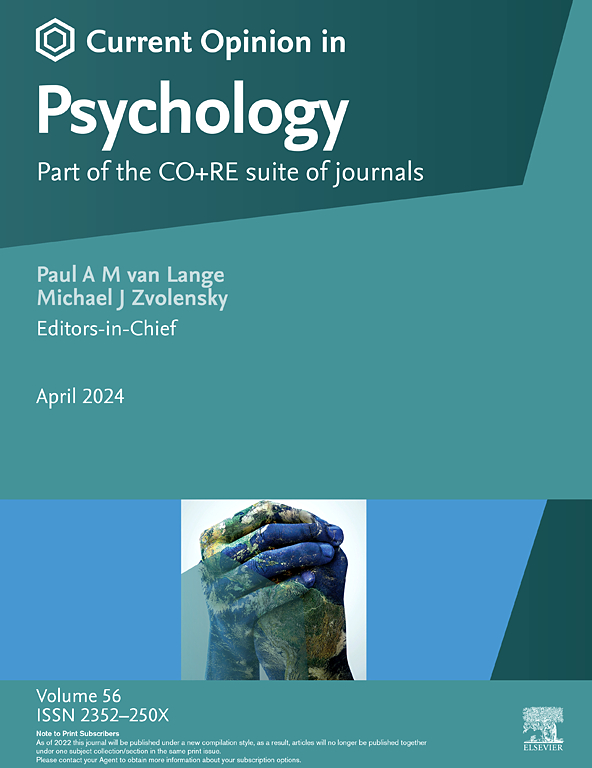规范和规范变革的近因和终因
IF 6.3
2区 心理学
Q1 PSYCHOLOGY, MULTIDISCIPLINARY
引用次数: 0
摘要
我们描述了一个规范心理学的正式模型,该模型可用于更好地理解规范的变化。该模型整合了规范行为的几个近似驱动因素:关于 a) 物质回报、b) 个人规范、c) 同伴不认可、d) 服从以及 e) 遵从权威的信念和偏好。此外,我们还回顾了有关这些规范行为近似驱动因素最终基础的跨学科研究。最后,我们讨论了建议的正式框架与几个心理学子领域之间的整合机会。本文章由计算机程序翻译,如有差异,请以英文原文为准。
Proximate and ultimate drivers of norms and norm change
We describe a formal model of norm psychology that can be applied to better understand norm change. The model integrates several proximate drivers of normative behavior: beliefs and preferences about a) material payoffs, b) personal norms, c) peer disapproval, d) conformity, and e) authority compliance. Additionally, we review interdisciplinary research on ultimate foundations of these proximate drivers of normative behavior. Finally, we discuss opportunities for integration between the proposed formal framework and several psychological sub-fields.
求助全文
通过发布文献求助,成功后即可免费获取论文全文。
去求助
来源期刊

Current Opinion in Psychology
PSYCHOLOGY, MULTIDISCIPLINARY-
CiteScore
12.10
自引率
3.40%
发文量
293
审稿时长
53 days
期刊介绍:
Current Opinion in Psychology is part of the Current Opinion and Research (CO+RE) suite of journals and is a companion to the primary research, open access journal, Current Research in Ecological and Social Psychology. CO+RE journals leverage the Current Opinion legacy of editorial excellence, high-impact, and global reach to ensure they are a widely-read resource that is integral to scientists' workflows.
Current Opinion in Psychology is divided into themed sections, some of which may be reviewed on an annual basis if appropriate. The amount of space devoted to each section is related to its importance. The topics covered will include:
* Biological psychology
* Clinical psychology
* Cognitive psychology
* Community psychology
* Comparative psychology
* Developmental psychology
* Educational psychology
* Environmental psychology
* Evolutionary psychology
* Health psychology
* Neuropsychology
* Personality psychology
* Social psychology
 求助内容:
求助内容: 应助结果提醒方式:
应助结果提醒方式:


